Even the best companies can’t avoid getting a negative review or 2. It happens! But with online reputation management, you can give yourself a chance to make a great first impression online, every single time.
But the thing is, managing your online reputation can be overwhelming. There is so much information and it is not always clear where to start. That is why we put together this guide – to break down the process into easy steps and show you exactly what you need to do to build and maintain a strong online reputation.
What Is Online Reputation Management?
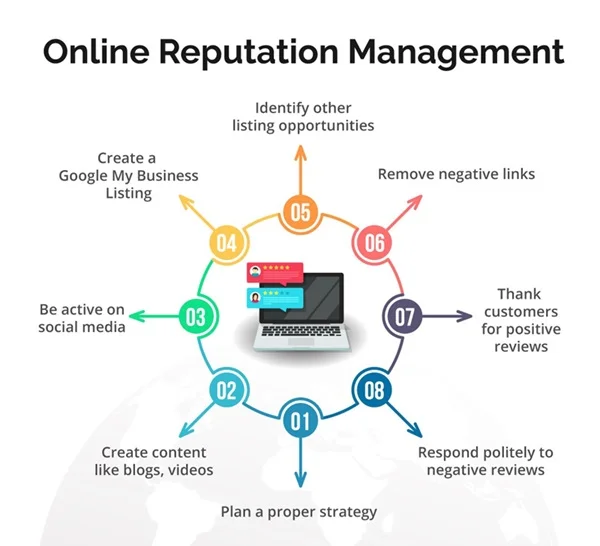
Online reputation management (ORM) is the process of monitoring, influencing, and maintaining your business’s public perception on the Internet. It includes several strategies and techniques to make sure your online reputation is accurate.
There are several factors that influence online reputation, 5 most important ones are:
- Customer Reviews: These are word-of-mouth advertising for the digital age. People read reviews before trying a new business; a string of negative feedback can scare them away. Positive reviews, however, build trust and credibility.
- Search Engine Ranking: When someone searches for your business online, the results that appear first shape their initial impression. If your website and positive reviews rank high, they will think highly of your brand. But if negative articles or reviews dominate the search results, it can damage your reputation.
- Social Media Presence: If you are active, engaging, and share positive content on social media, it reflects well on you. But if your social media is neglected or full of negativity, it can hurt your reputation.
- Responding to Reviews (Good and Bad): How you handle online feedback matters. Ignoring reviews, especially negative ones, makes you seem dismissive. But responding promptly and professionally shows you care about customer experience.
- Overall Online Presence: Your online reputation isn’t just about one platform. It is the sum of everything you put out there: your website, social media, review sites, and even personal information. So keep a consistent, professional image across all these platforms to strengthen your online reputation.
Why Is Online Reputation Management Important For Your Business?
People trust what they see and read online, and that trust heavily influences their purchasing decisions. Here’s why an online reputation management strategy is important for your business:
1. Influences Purchasing Decisions
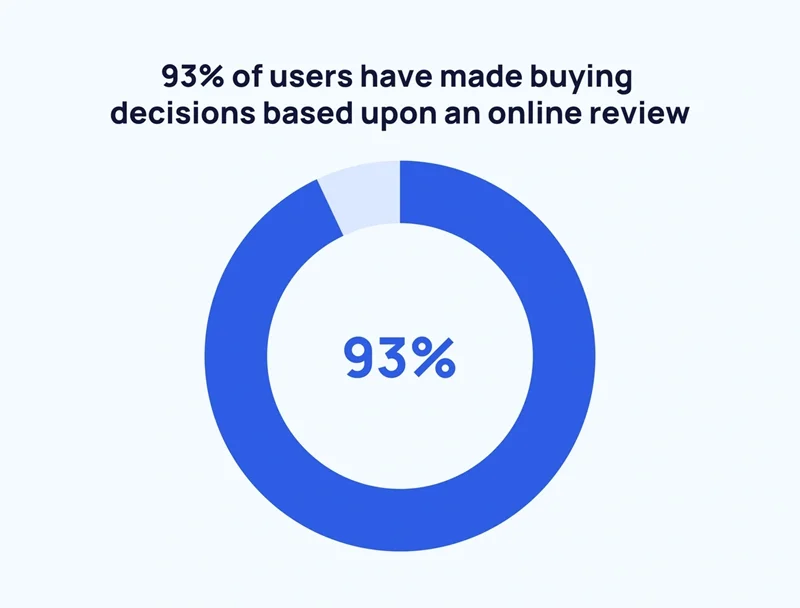
93% of users say online reviews impact their buying decisions. That’s right. People trust what other customers say about your business. They act as social proof and show the value your business offers.
Positive reviews with happy customers singing your praises can convince someone on the fence to buy from you. On the other hand, negative reviews with complaints can scare away potential customers. They will take their business elsewhere if they feel there is a risk of a bad experience.
2. Attracts New Customers & Retains Existing Ones
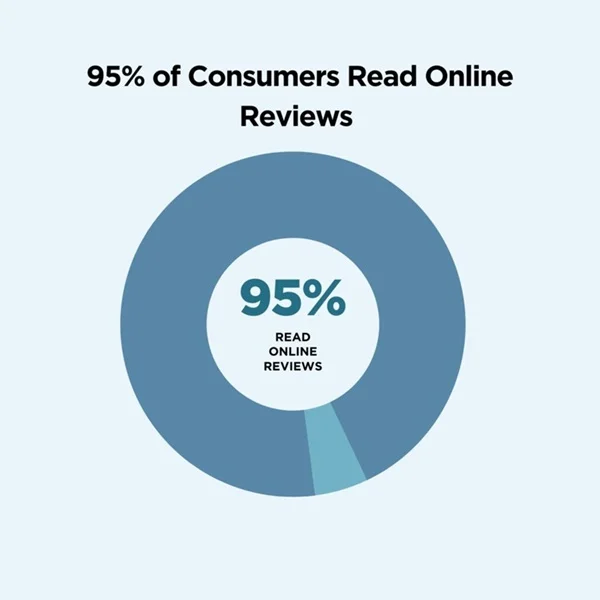
Positive word-of-mouth is powerful and online reviews are the digital version of that. 95% of customers read online reviews before making a purchase.
Having a strong online brand reputation with lots of positive reviews makes your business more discoverable. People searching for what you offer are more likely to find you online; a positive reputation will convince them to give you a try.
But it is not just about attracting new customers. Online brand reputation management also helps you retain existing ones. They might even recommend you to their friends and family, turning them into brand advocates. After all, if you consistently deliver great service and address issues quickly, customers will stick with you, right?
3. Increases Online Visibility & Search Engine Rankings
Search engines like Google consider positive reviews a sign of trust and quality. You can encourage happy customers to leave reviews by managing your brand’s online reputation.
These reviews and a strong online presence with accurate information can bump your website up in search results. This makes it easier for potential customers to find you and more website traffic means more potential customers.
4. Protects Brand Image
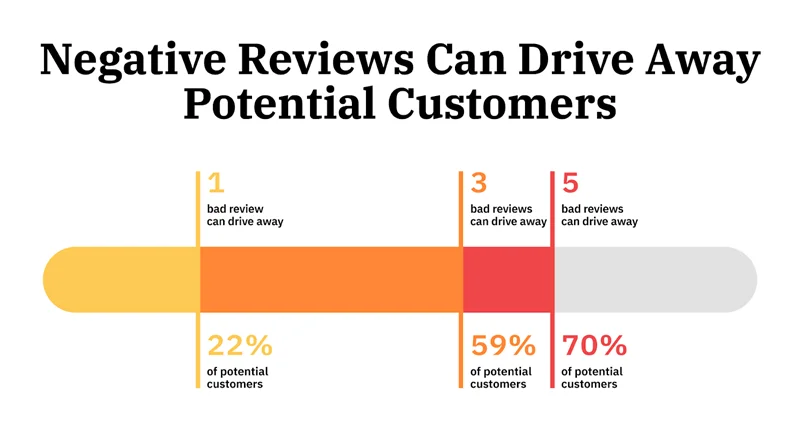
One bad experience can spread online quickly, if left unaddressed, it can damage your brand image and reputation. A single negative review can scare away up to 22% of potential customers.
Online reputation management helps you address concerns and apologize for mistakes. You show potential customers you care about their experience and take feedback seriously.
Now this is important for any business that wants to survive online. But it is even more critical for companies in the health and wellness industry, like this sports supplements brand.
Just to give you an idea, one of their products alone has 5,066 reviews with an average rating of 4.53 out of 5. The sheer number of these reviews shows their credibility and positive brand image.

But why have they focused on this? Because they know they are dealing with people’s trust and the customers are counting on them for their well-being. They can’t risk any product or service falling short. That is why they prioritize quality products and work hard to maintain a positive online reputation.
A negative review in this space would hold much more weight than a bad review about, say, a restaurant. The stakes are higher, so the risk of someone turning away is much greater.
5. Mitigates Negative Reviews
Negative reviews are inevitable and they can hurt your brand’s online reputation. But how you handle them matters. Online reputation management helps you catch negative reviews early and address them before they can cause serious damage.
When you respond promptly and professionally to negative reviews, you can control the narrative and minimize the impact. Plus, you can turn them into opportunities through your customer service skills. Some unhappy customers might be impressed by your responsiveness and change their negative reviews into a positive testament.
6. Attracts Top Talent
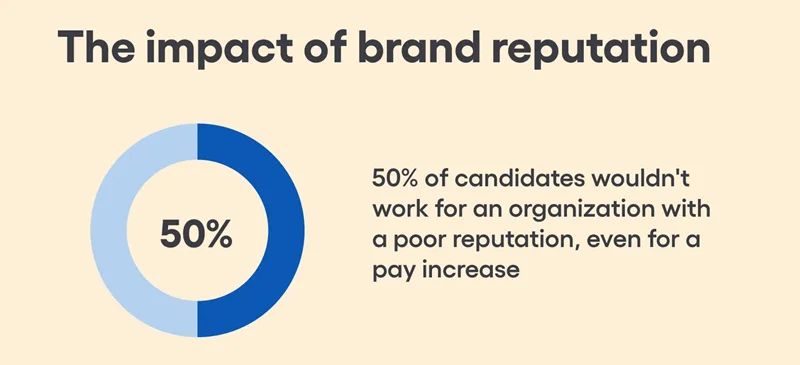
50% of the candidates wouldn’t take a job that pays more if the company has a bad reputation. That is how important online reputation is when it comes to hiring top talent. Talented people have options so most would rather work for a company that is known for treating employees well and delivering great work.
A strong online reputation shows potential hires that you are a good company to work for. It tells them you care about your employees and that they will be happy working with you. This can give you a big advantage when attracting top talent.
6 Strategies To Do Online Reputation Management The Right Way
41% of businesses say a negative online reputation has actually cost them money. That is a pretty good reason to take online reputation management seriously. So to help you avoid that fate, follow these 6 key strategies for building and maintaining a stellar online reputation.
Implement Sentiment Analysis
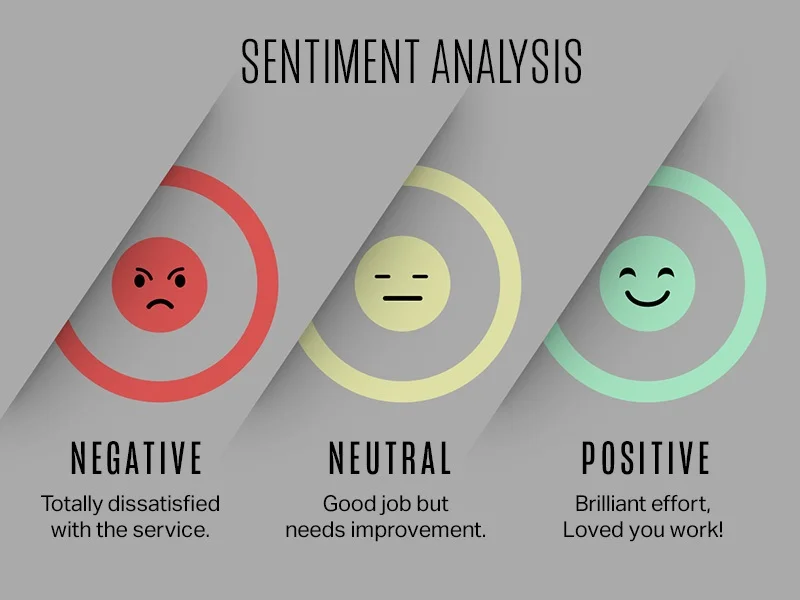
Sentiment analysis is a technology that scans online conversations – reviews, social media posts, news articles – and analyzes the emotions behind the words. Here’s how it works:
- Sentiment analysis tools gather information from various online sources. This could include reviews on Google, Yelp, or industry-specific platforms. Social media posts, news articles, and even forum discussions are fair game.
- The tool then analyzes the language used in these online mentions. It identifies positive words like “excellent” or “satisfied,” negative words like “disappointed” or “faulty,” and even neutral ones.
- Finally, you get a clear picture of the overall sentiment surrounding your brand online. Are people raving about your products? Upset with customer service? This valuable data helps you understand your strengths and weaknesses.
Use Online Sentiment Manipulation Techniques
Once you understand what people are saying, you can use online sentiment manipulation techniques to shape the conversation. But don’t be fooled by the term “manipulation.” Here, it is about strategically positively influencing the online narrative.
Here are the effective techniques:
- Address negative comments quickly and apologize for any mistakes. Show customers you care about their experience.
- Happy customers are often silent online. Ask satisfied clients to leave reviews on relevant platforms. Positive reviews push your reputation up in search results.
- Connect with your audience on a deeper level. Share your company’s mission, values, and the people behind the brand.
- Share informative and engaging content that shows your expertise or brand value. This makes you a thought leader and builds trust with your audience.
Employ Advanced SEO Strategies Targeting Specific Keywords
When people search for terms related to you or your business, you want your website and positive content to appear at the top of search results. Here’s how advanced SEO helps with reputation management:
- Don’t just aim for your brand name. Identify keywords related to positive attributes you want to be associated with. For example, a restaurant might target “best pizza in town” or “excellent customer service.”
- Make sure your website content naturally includes those keywords. This helps search engines understand what your site is about and rank it higher for relevant searches.
- If you are a local business, focus on keywords that include your city or region. This helps people searching nearby discover you easily.
- Build backlinks to your content. Reach out to reputable websites and ask them to link to your content. The higher you rank, the more control you have over what people see about your business.
- Monitor your search engine rankings regularly. Use tools like Google Analytics and SEMrush to track your performance. If you see negative content ranking higher, create more positive content to push it down in the search results.
Deploy AI-Powered Chatbots For Real-Time Reputation Management
In today’s fast-paced world, you must respond to online negativity early. But you can’t be online all the time, so you need AI-powered chatbots for the job. These chatbots are computer programs that can interact with people online. Here’s how they can be used in reputation management:
- First, use Onlypult to analyze mentions by sources and periods. This can help you identify where conversations about your brand are happening and what people are saying.
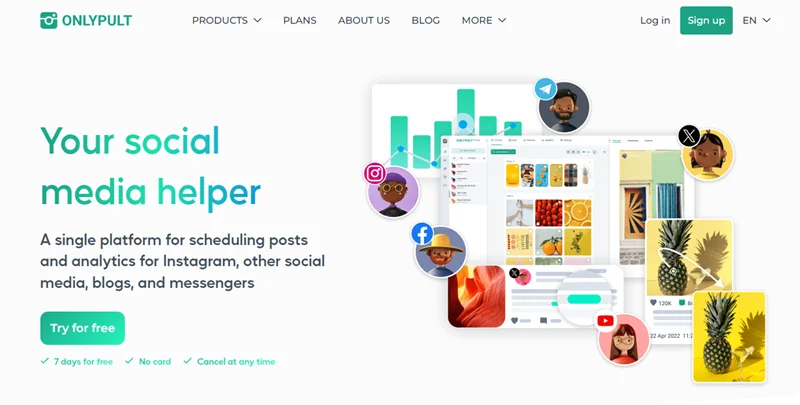
- Integrate chatbots into your website and social media platforms so they can interact with your customers directly. Make sure the chatbots are programmed with accurate business information.
- Configure the chatbot to respond to negative comments and reviews. It can acknowledge the issue and offer solutions. The chatbot can also escalate complex issues to a human representative if needed.
- Collect data from chatbot interactions and analyze it to identify common issues and areas for improvement.
- Make sure the chatbot is constantly learning and improving. Use machine learning algorithms to refine its responses based on past interactions.
Implement Strategic Content Syndication Across Authoritative Platforms
Content is king in the online world and it is a powerful tool for building a strong reputation. But simply creating content isn’t enough. You need content syndication to get it in front of the right eyes. Here’s how to do it the right way:
- Identify authoritative platforms in your industry. These platforms should have a large audience and a good reputation.
- Create high-quality content for these platforms. This could be articles, blog posts, videos, or infographics. Make sure the content is well-researched and informative and provides value to the audience of the platform.
- Reach out to these platforms and pitch your content. Explain how your content will benefit their audience. Be persistent and follow up regularly.
- Once your content is published, promote it through your own channels. Share it on your social media profiles, email newsletters, and website.
Employ Ethical Hacking Techniques To Preemptively Protect Against Online Threats
Think hackers only target big corporations? Not necessarily. Anyone with an online presence can be vulnerable. Ethical hacking is about hiring ethical hackers to break into your systems – with your permission, of course. They identify weaknesses in your online defenses before anyone malicious can exploit them.
Here’s how to protect your reputation:
- Start by hiring certified ethical hackers. Look for certifications like CEH (Certified Ethical Hacker) or CISSP (Certified Information Systems Security Professional).
- Conduct a detailed security assessment of your online assets – website, social media accounts, and any other online platforms you use. Ethical hackers will simulate attacks to identify weak points.
- Address the vulnerabilities found during the assessment. These could be updating software, changing passwords, or enhancing encryption.
- Use tools like IBM QRadar or ThreatConnect that can detect and alert you to suspicious activities.
- Educate your team about security best practices. Make sure everyone knows how to recognize phishing attempts, use strong passwords, and handle sensitive information. Regular training sessions can help keep security top of mind.
3 Best Online Reputation Management Services
Reputation management can be tricky. So it is best to get help from the experts – online reputation management companies. For each company we picked, pay special attention to their specialties and match them with your use case.
WebiMax
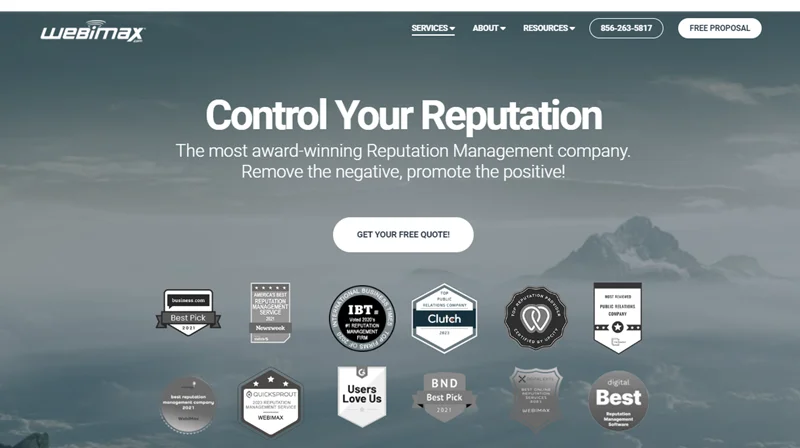
WebiMax focuses on proactive reputation management strategies. This reputation management company helps you build a strong online presence with positive reviews and content that pushes down negative search results. Their key services include:
- Tracks your reputation online across review sites, social media, and other online platforms
- Crafts responses to both positive & negative reviews.
- Uses SEO to boost positive content in search results.
- Builds a strong online presence with engaging content & social media.
- Develops a customized reputation management strategy.
NetReputation
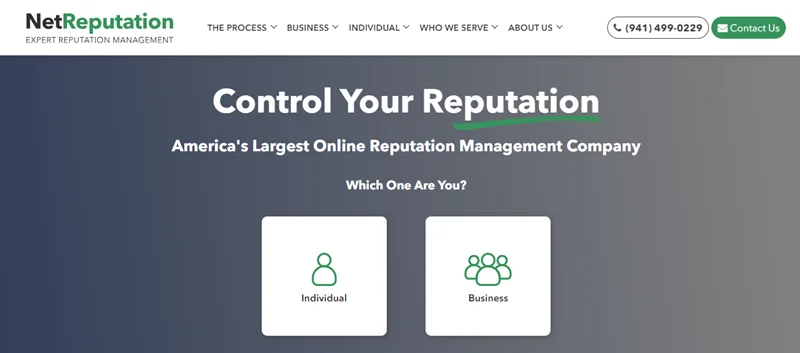
NetReputation combines online monitoring with public relations strategies to handle negative feedback and promote positive content. Here’s what they can do for you:
- 24/7 monitoring across the web, news, social media, and forums.
- Sentiment analysis to understand how people feel about your brand.
- Crafts responses to negative reviews and press.
- Works to remove unfair content online.
- Protects trademarks and copyrights online.
Reputation Defense Network
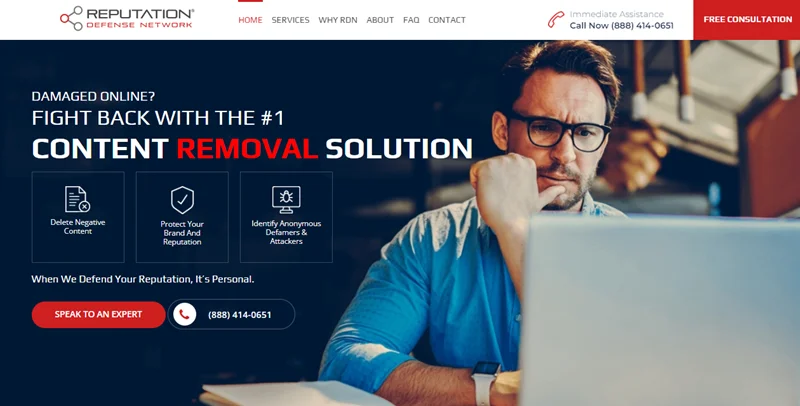
Reputation Defense Network is a good option if you are facing serious online reputation issues, like a crisis or a barrage of negative reviews. They specialize in helping businesses recover from online damage. Here are their key services:
- Crisis management plans for negative situations.
- Legal removal of defamatory or false online information.
- Develop strategies to rebuild online reputation after negativity.
- Offers ongoing monitoring to prevent future issues.
Conclusion
While you can’t erase everything from the internet, you can use our online reputation management strategies to shape the way people perceive you when they search for your business. Now it is up to you: will you let your online reputation happen to you, or will you take control and make it happen for you?
Onlypult is a social media management tool that lets you schedule posts for various platforms, all in one place. Plus, with our tool’s analytics, you can measure the impact of your social media efforts and see what is resonating with your audience. Get in touch with us to take control of your online narrative.






